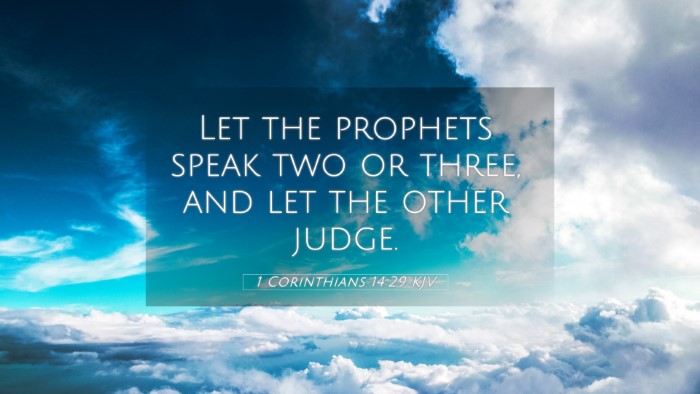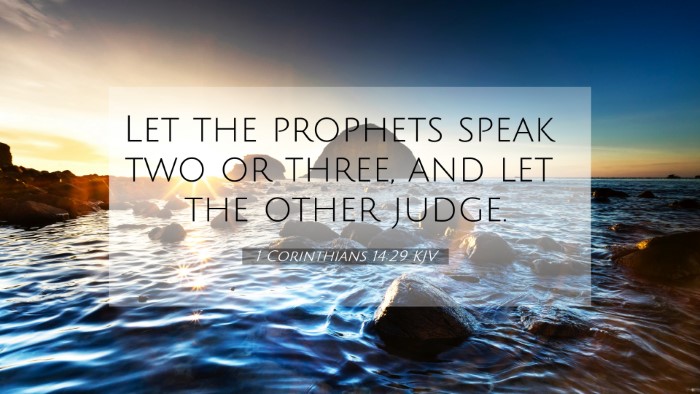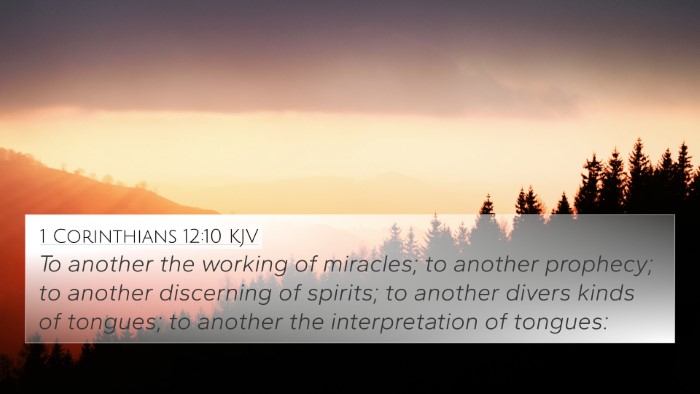Understanding 1 Corinthians 14:29
Verse: "Let the prophets speak two or three, and let the other judge."
This verse addresses the orderly conduct of prophecy within the church gatherings, emphasizing the necessity of discernment and accountability among those who speak on behalf of God. Below, we delve into the interpretations and insights gathered from prominent public domain commentaries by Matthew Henry, Albert Barnes, and Adam Clarke.
Meaning and Context
The Apostle Paul, in this chapter, is providing guidelines for the exercise of spiritual gifts, particularly the gift of prophecy. This regulation is an effort to maintain order when speaking in tongues and prophesying during church assemblies.
- Matthew Henry's Commentary:
Henry emphasizes the importance of order in worship and communication within the church. He notes that allowing only two or three prophets to speak ensures that each message is weighed and judged by others, thus preventing confusion and misrepresentation of God's word.
- Albert Barnes' Commentary:
Barnes highlights the necessity of discernment in the spiritual gifts. He points out that the church should not only encourage prophetic utterances but also exercise caution and judgment to maintain the integrity of the divine message being communicated.
- Adam Clarke's Commentary:
Clarke underlines the communal aspect of prophecy, indicating that all are engaged in the process of discernment. He speaks on the collective responsibility of the church community to evaluate prophetic words, emphasizing that the prophecy must align with the established doctrine of faith.
Key Insights
The emphasis on a limited number of prophets speaking highlights the value placed on clarity and coherence in worship services. The act of "letting the other judge" reflects the communal nature of discernment in the church, wherein members take part in upholding doctrinal integrity. This can be applied to current practices within church services to ensure that every spiritual gift is exercised in a manner that edifies the body of Christ.
Cross-References from 1 Corinthians 14:29
- 1 Thessalonians 5:20-21: "Do not despise prophecies, but test everything; hold fast what is good."
- Acts 20:32: "And now I commend you to God and to the word of his grace, which is able to build you up and to give you the inheritance among all those who are sanctified."
- 1 Corinthians 12:10: "To another the working of miracles, to another prophecy, to another the ability to distinguish between spirits..."
- 1 John 4:1: "Beloved, do not believe every spirit, but test the spirits to see whether they are from God."
- Matthew 7:15-20: "Beware of false prophets, who come to you in sheep’s clothing but inwardly are ravenous wolves..."
- Ephesians 4:11-12: "And he gave the apostles, the prophets, the evangelists, the shepherds and teachers, to equip the saints for the work of ministry..."
- 2 Corinthians 2:17: "For we are not, like so many, peddlers of God’s word, but as men of sincerity, as commissioned by God..."
- Hebrews 5:14: "But solid food is for the mature, for those who have their powers of discernment trained by constant practice to distinguish good from evil."
- Colossians 3:16: "Let the word of Christ dwell in you richly, teaching and admonishing one another in all wisdom...”
- Romans 12:6-8: "Having gifts that differ according to the grace given to us, let us use them..."
Thematic Connections
1 Corinthians 14:29 can be linked to various theological themes, including the role of the Church, the manifestation of Spiritual Gifts, and the necessity of Sound Doctrine. These themes are further reflected in the verses provided above, which together create a comprehensive framework for understanding the responsibilities and expectations placed on individuals who proclaim the message of God.
Conclusion
The guidance provided in 1 Corinthians 14:29 is as relevant today as it was in the early church. The structured approach to prophecy not only promotes orderly worship but also fosters a spirit of accountability and discernment within the community of believers. For those engaged in Bible study or sermon preparation, understanding this verse through a cross-referencing lens facilitates a deeper comprehension of how the New Testament encourages believers to interact with prophetic messages and spiritual gifts.
Using Cross-References as a Tool
Utilizing cross-references is a vital method for enriching one’s study of scripture and discovering the interconnectedness of biblical themes. Here are some tools and approaches to effectively use cross-referencing:
- Bible Concordance: A concordance can help locate scripture references related to a specific verse or topic.
- Bible Cross-Reference Guide: This guide allows for easy navigation through related verses.
- Cross-Reference Bible Study: Engaging in a study that focuses on interrelated verses helps deepen understanding.
- How to Use Bible Cross-References: Learning to identify and utilize references enhances comprehension of biblical theology.
- Bible Chain References: This method links verses together thematically, providing a pathway through Scripture.
In summary, 1 Corinthians 14:29 serves as an important reminder of the order and accountability needed in prophetic utterance while also showcasing the importance of community discernment in spiritual matters.






